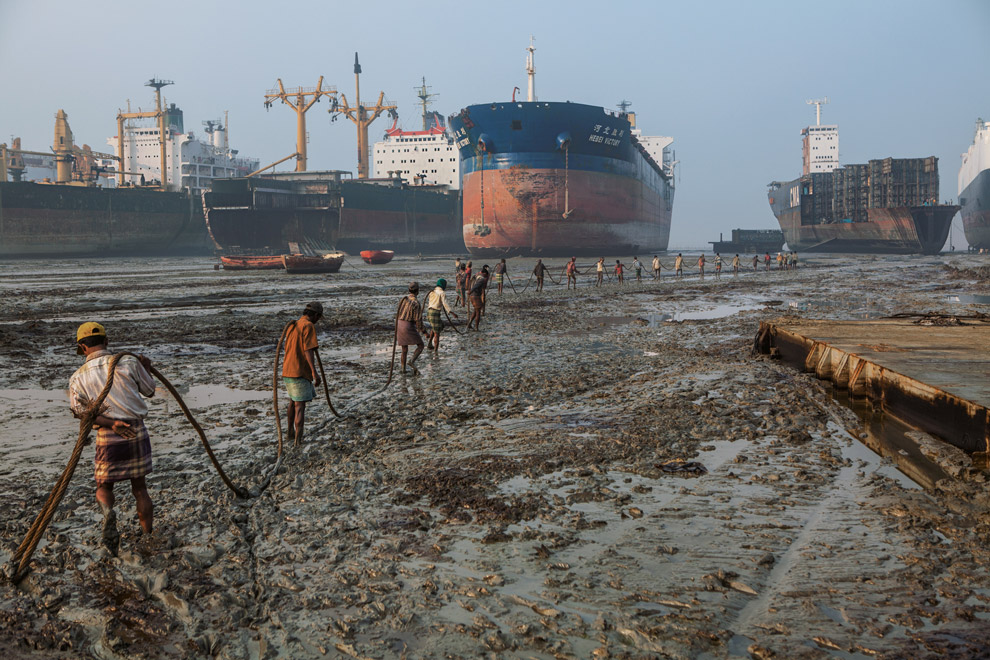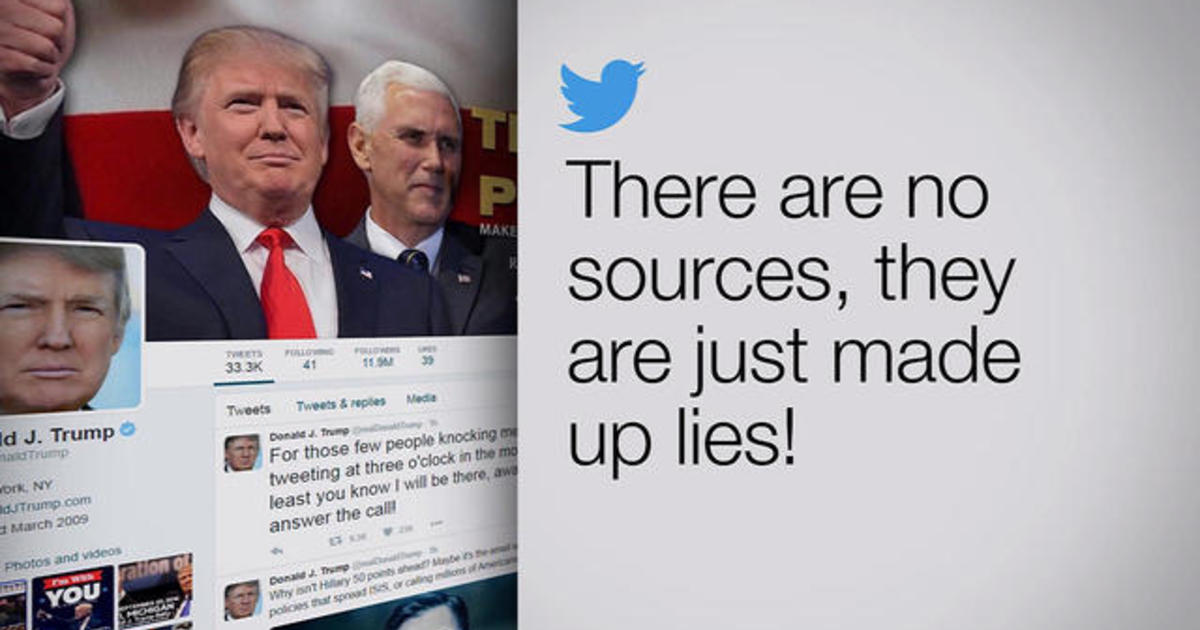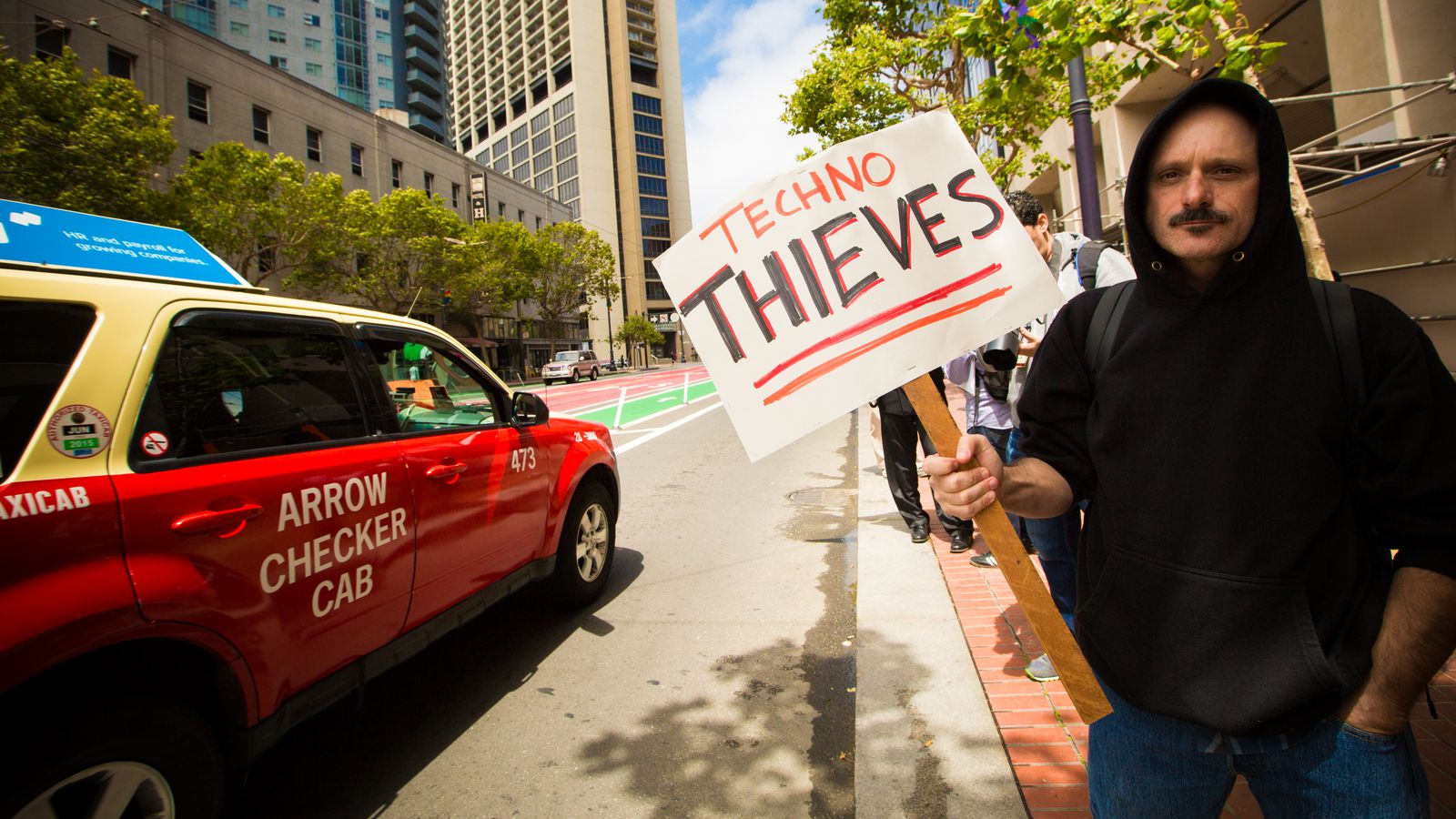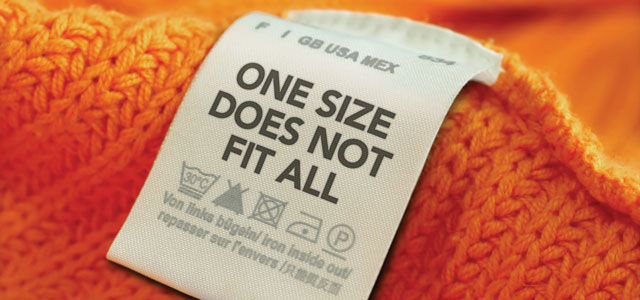By Karin Buhmann.
Dansk version nedenfor/Danish version below
Over the past weeks, news has emerged that Maersk, the world’s largest shipping company, which is based in Denmark, is having some of its container ships scrapped (cut up for materials to be recycled) under sub-standard conditions at beaches in India and Bangladesh. While Danish media have paid considerable attention to this and investors are asking critical questions of Maersk’s alignment between its CSR policies and practices, much less attention was paid to a case of severe critique of a Danish textile company that sourced from a supplier in the Rana Plaza building around the time of the building’s collapse.
What do these two cases have in common? More than one might expect, judging from the way they have been treated by media and business association statements. This applies with regard to business practices as well as research. But whereas one company’s understanding of due diligence appears very weak, the other displays a due diligence understanding that holds bigger promise for the longer term.
Company challenges in relation to risk-based due diligence
Both cases concern businesses’ exercise of risk-based due diligence. This is a process for businesses to avoid causing social or environmental harm. According to OECD’s Guidelines for Multinational Enterprises, enterprises should carry out due diligence to identify, prevent and mitigate actual and potential adverse impacts on human rights, industrial issues including labour standards, the environment etc. Enterprises should also carry out due diligence in relation to their suppliers and other business relations, to seek to prevent or mitigate adverse impact that is directly linked to their operations, products or services. This applies to yards scrapping ships as well as factories sewing clothing to be sold in stores in Denmark or elsewhere.
The Maersk case is an example of company that has problems walking its own CSR talk. But it is also an example of a company that has paid attention to the risks caused by its decision to scrap ships in India and taken certain steps to prevent such damage from occurring, suggesting due diligence has been exercised to a certain extent. However, the information that has emerged in recent weeks suggests that the due diligence process has not been adequately carried through from beginning to end of the activity in question. The textile case concerns a company that did not adequately carry out core due diligence elements in regard to its supplier in Bangladesh, where the prevalence of severe building safety issues was well-known already prior to the Rana Plaza collapse.
NCP: severe critique of Danish textile producer sourcing from Rana Plaza
On October 17, 2016, the Danish National Contact Point (NCP) under OECD’s Guidelines issued a statement following a complaint concerning the practices of a Danish textile company in relation to, amongst others, occupational health and safety standards at the supplier in Rana Plaza. The NCP statement severely criticized the due diligence processes of the Danish company. Amongst others, the statement noted that the company neglected to make adequate requirements of the supplier in relation to a CSR policy; neglected to require the supplier to perform self-evaluation; and neglected to monitor and follow up on such self-evaluations.
This is the first time not only in Denmark but internationally that a public institution with expertise in CSR states specific critique of the due diligence processes of a company supplying from Rana Plaza. In view of the large number of casualties resulting from the collapse on 24 April 2013 and the subsequent attention that the tragedy has generated with media and consumers, one wonders why the critique of the Danish company has received such limited attention.
Press releases from business associations and the organization that lodged the complaint have highlighted the fact that the NCP did not pronounce the company accountable for the collapse (in some cases mistakenly communicated as ‘liability’ rather than accountability). Notwithstanding that the NCP’s powers do not enable it to attribute legal liability and the fact that the NCP made its assessment on the basis of documentation that it has been presented with or was able to investigate, that part of the statement has been allowed to dominate. The critique and the lessons on the importance of due diligence that the statement holds for Danish (and other) companies has received much less attention. Apart from the critique of the specific company, the NCP statement also underscores that it follows from OECD’s Guidelines that companies should require suppliers to protect their employees’ occupational health and safety, and that this responsibility today includes risk assessment in relation to building safety and integrity. From a research perspective it is surprising that business associations, despite differences in the way they have covered the issue, have not make more of an effort to explain the significance to their members.
Complexity and context
Ensuring responsible business conduct in chains of business relations is often complex. Turning talk (or policies) into walk (or practice) is frequently challenging in view of the conditions in some of the countries from which Danish companies supply textiles, or where ships are scrapped. Poverty and local socio-economic conditions lead to employees accepting salaries and working condition far below international standards. Unfortunately, these problems are rarely solved overnight. Implementing norms for occupational health and safety does not just require the relevant rules to be in place, but also that they are communicated and explained to employees and managers, and that qualified training and monitoring takes place. Changing dangerous working methods or buildings requires not just investment, but also time and attention. And as in other fields, perfection requires practice.
Outlook
Maersk has a CSR problem because its ship scrapping practices are not in accordance with the company’s own standards. Yet, Maersk has also demonstrated awareness of risks. When Maersk decided to have ships scrapped at the Alang beach in India, it was also decided to take on three employees to monitor the observance of Maersk’s standards. This suggests a degree of due diligence. However, due diligence is a continuous process. The Alang-case demonstrates that having employees in place to monitor observance of standards is not sufficient, if this is not followed by processes to ensure that the monitoring identifies the problems it is intended to find. The related case of ships previously owned by Maersk now being scrapped on beaches in Bangladesh demonstrates the significance of also incorporating risk-based due diligence in relation to economic stipulations incorporated into contracts. However, the Maersk case also offers an example of a company that is working on practicing to walk its talk. The commitment to improve and to internal learning expressed by Maersk in follow-up to the media reports and investor critique raises more hope for the implementation of due diligence than does the reception of the critique of the textile company.
Om samfundsansvar i skibsophugning, tekstilsektoren, og om at tage ansvar alvorligt og øve sig
I ugen med efterårsferien meldte investorer sig med spørgsmål om ophugningen af udtjente Mærsk-skibe på strande i Indien og Bangladesh, og mediernes interesse for sagen fortsatte. Derimod fik en alvorlig kritik, som er blevet udtalt over en dansk tekstilvirksomhed, der fik syet tøj hos en leverandør i Rana Plaza bygningen omkring tidspunktet for bygningens sammenstyrtning i 2013, ganske begrænset opmærksomhed i pressen.
Hvad har de to sager til fælles? Mere end man skulle tro fra den måde, de er blevet behandlet i medier og meddelelser fra erhvervsorganisationer. Det gælder både praktisk og forskningsmæssigt.
Begge sager handler om virksomheders risikobaserede due diligence (på dansk somme tider oversat ’nødvendig omhu’, som ikke skal forveksles med ’rettidig omhu’). Risikobaseret due diligence er en proces til at sikre, at en virksomhed undgår at forvolde skader på mennesker og miljø. Ifølge OECDs retningslinjer for multinationale virksomheder, som Danmark har tiltrådt, skal virksomheder udføre risikobaseret due diligence for at undgå og modvirke skade på miljø, menneskerettigheder, arbejdstagerrettigheder mv. Virksomheder skal også udøve due diligence i forhold til deres leverandører og andre forretningsforbindelser. Det gælder både værfter, der hugger skibe op, og systuer, der laver tøj til danske herretøjsbutikker.
Mærsk-sagen viser en virksomhed, som har haft problemer med et leve op til sine egne standarder og politikker om CSR. Men det viser også en virksomhed, som har været opmærksom på sin mulige skadesrisiko og taget skridt til at modvirke det. Det er udtryk for due diligence. De oplysninger, som er kommet frem de seneste uger tyder på, at virksomhedens due diligence ikke har været ført tilstrækkeligt igennem. Mere om det senere. Tekstilsagen handler om en virksomhed, som ikke løftede en række centrale elementer i due diligence i forhold til sin leverandør i Bangladesh, hvor det allerede inden Rana Plaza styrtede sammen var kendt, at der var alvorlige problemer med bygningssikkerhed og ansattes arbejdsforhold.
Det danske nationale kontaktpunkt for OECDs retningslinjer for multinationale virksomheder offentliggjorde mandag i uge 42 en udtalelse på baggrund af en klage over en dansk producent af herretøjs håndtering af bl.a. sundheds og sikkerhed på arbejdspladsen hos virksomhedens leverandør i Rana Plaza. Kontaktpunktet (som på dansk kaldes Mæglings- og Klageinstitutionen for Ansvarlig Virksomhedsadfærd eller bare MKI) udtalte alvorlig kritik af den danske virksomheds processer for risiko-baseret due diligence. Det blev bl.a. kritiseret, at virksomheden ikke i tilstrækkelig grad stillede krav til leverandøren i form af en CSR-politik; og ikke i tilstrækkelig grad anmodede leverandøren om selvevaluering og gennemgik selvevalueringer med henblik på at fastslå, hvad der skulle kontrolleres og følges op på.
Det er ikke bare i dansk sammenhæng men også internationalt første gang, at en offentlig autoritet med ekspertise inden for CSR-feltet udtaler konkret kritik af en virksomhed, der fik produceret på Rana Plaza. I betragtning af det store antal mennesker, der omkom eller kom til skade, da bygningen styrtede sammen den 24. april 2013 og i betragtning af den interesse, som Rana Plaza-tragedien har haft blandt medier og forbrugere kan det undre, at kritikken af den danske virksomheds due diligence fik så lidt opmærksomhed.
Pressemeddelelser fra erhvervsorganisationer og den organisation, der indgav klagen, har i stedet fremhævet, at kontaktpunktet ikke fandt virksomheden ansvarlig for sammenstyrtningen. Uden skelen til, at kontaktpunktet ikke har kompetence til at pålægge juridisk ansvar og kun har forholdt sig til de oplysninger, det har fået dokumenteret eller haft mulighed for at undersøge ift hvad en kontrol kunne have vist, har denne del af udtalelsen fået lov at dominere. Det, som danske virksomheder bør skrive sig bag øret om krav om due diligence, har fået meget mindre opmærksomhed. Udover den alvorlige kritik af tekstilvirksomheden fastslår udtalelsen også, at virksomheder for at leve op til principperne i OECD’s retningslinjer bl.a. skal stille krav til leverandører til at sikre sundhed og sikkerhed på arbejdspladserne. Denne forpligtelse omfatter i dag også risikoafdækning af bygningskonstruktioners sikkerhed. Selv om der er forskelle i dækningen fra forskellige organisationer, er det fra en forskningsmæssig CSR-betragtning tankevækkende, at erhvervslivets organisationer ikke i højere grad har grebet muligheden for at forklare deres medlemmer, hvor vigtigt dette er.
Ansvarlig virksomhedsadfærd i kæden af en virksomheds forretningsforbindelser er ofte komplekst. Der kan være langt fra idealer og politikker til den praktiske virkelighed, der gælder i lande, hvor danske virksomheder får produceret tekstiler, eller hvor skibe ophugges. Fattigdom og lokale samfundsøkonomiske forhold er ofte årsagen til, at mennesker sælger deres arbejdskraft for løn og arbejdsbetingelser, der ligger langt fra internationale standarder. Problemerne kan desværre sjældent løses fra den ene dag til den anden. At gennemføre normer for sundhed og sikkerhed på arbejdspladsen kræver ikke bare, at regler findes, men også at de formidles til de ansatte og deres ledere, og at der foregår en solid oplæring og kontrol. At ændre farlige arbejdsmetoder eller bygninger kræver ikke bare investeringer, men også tid og opmærksomhed. Og som ved andre vanskelige opgaver kræver perfektion øvelse.
Mærsk har et problem med manglende overensstemmelse mellem sine egne standarder og deres gennemførelse. Men Mærsk har også vist, at man er er opmærksom på at udvise due diligence. Da Mærsk besluttede at få skibe ophugget på Alang-stranden i Indien, besluttede man samtidig at ansætte folk til at kontrollere, at Mærsks standarder blev overholdt. Det er udtryk for due diligence. Men risikobaseret due diligence er en løbende proces. Alang-sagen viser, at det ikke er nok at placere kontrollører, hvis man ikke også har processer for at checke, at kontrollerne fanger de problemer, som de skal. Sagen om ophugning af tidligere Mærsk-skibe på strande i Bangladesh viser, at due diligence også bør gennemsyre en virksomheds økonomiske betingelser, der indgår i kontrakter. Men Mærsk-sagen viser også en virksomhed, som kan siges at være i gang med at øve sig. Den vilje til forbedring og intern læring, som Mærsk har givet udtryk for, giver grund til større håb for gennemførelse af risikobaseret due diligence end den, som tekstilsagen er blevet modtaget med.
Karin Buhmann har fornylig været på TV2 for at diskutere Mærsks kontroversielle skrot politik og CSR.
Karin Buhmann is Professor (mso) in Business & Human Rights at the Department of Intercultural Communication and Management at Copenhagen Business School.
pic by by Mike Hettwer, National Geographic




